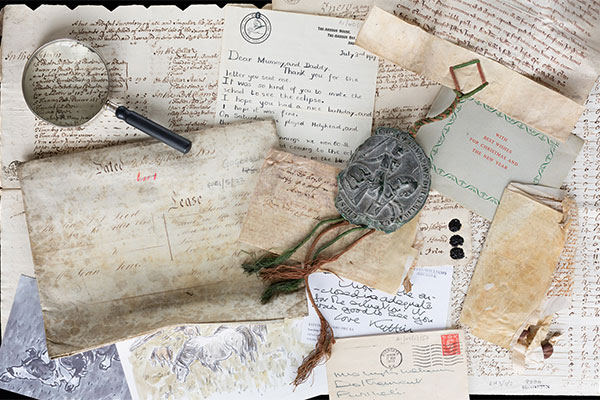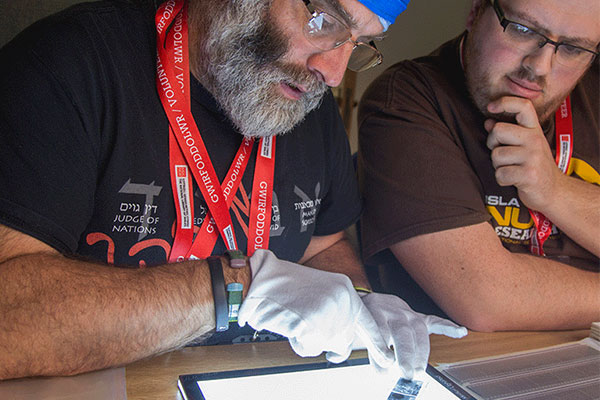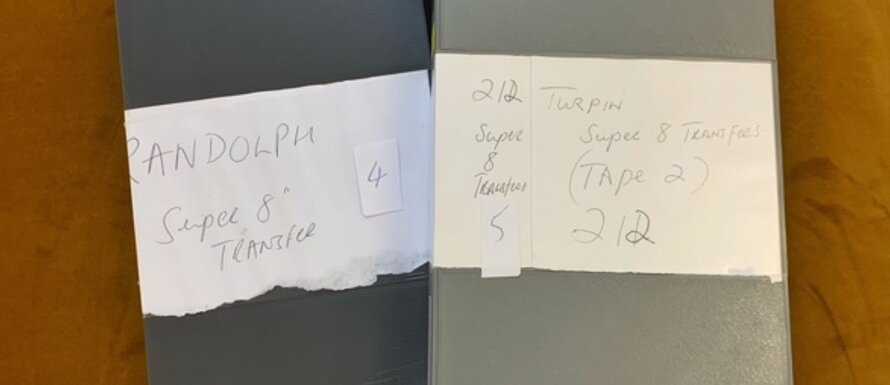As Moving Images Cataloguer I’m privileged to get to see a real variety of materials, from professional feature films, raw broadcast material, right through to completely amateur home movies.
Recently, I’ve been working on a collection from the broadcaster Eurwyn Williams, which includes tape transfers of a very special set of home movies: those of Randolph ‘Randy’ Turpin, a British boxing hero with a very strong Welsh connection.
Turpin was born in Leamington Spa, the youngest of five children, to a Black father, Lionel, from Guyana (known then as British Guiana), and white mother Beatrice. Lionel died within a year of Randolph’s birth, having never recovered from lung damage sustained from a gas attack during World War I.
Turpin’s upbringing was difficult, though the family was close, and he would battle hard to reach stardom. Turpin – and his brothers, Dick and Jackie – were notable for being among the first Black boxers to win titles after the British Boxing Board of Control lifted their colour bar in 1947, finally allowing Black boxers to compete professionally.
Despite reaching the heights of world titles, between failed business dealings and personal controversies (including accusations of domestic violence), his star would soon fade leading to a dark and contested end: dead at 37, supposedly by his own hand after attempting to murder his own daughter.
As one who knows very little about boxing, learning about Turpin and seeing his home movies has been a pleasurable and at times moving experience. It’s also been exciting to draw links between various of our collections, as well as beyond.
Eurwyn Williams is a prolific producer and television of film and television. As well as this particular collection of tapes, the National Library of Wales is also home to his script archive as well as some complete programmes, as part of the Wales Broadcast Archive.
This includes Randolph Turpin a Sugar Ray, which was presented by Orig Williams. While focusing on Turpin’s most famous fight, in which his surprise defeat of Sugar Ray Robinson made him world middleweight champion in 1951, the programme also emphasises Turpin’s Welshness due to his fondness for north Wales, due to his time training at Gwrych Castle, and his life there after meeting and marrying Gwyneth Price, who would become his second wife.
While only brief scenes from Turpin’s home movies are seen in that particular programme, the copies I have been working on feature extensive scenes of family life. In the scenes Turpin himself appears in front of the camera, his confident personality shines through.
Various family members feature in the films, including Turpin’s wife Gwyneth, their children, and other family members. As well as seeing the family at home, we see them out and about on holiday both in the UK and abroad in Europe. There are also scenes of the family at the Great Orme summit complex, owned by Turpin at the time, including footage of him boxing in the outdoor ring set up there.
I’m still working on describing and cataloguing this material (as well as others in the Eurwyn Williams collection). By being able to compare with and research other material we have available to us in the National Library of Wales’ collections, such as Randolph Turpin a Sugar Ray, I’ll be able to find out more about some of the people, places and contexts found in the home movies.
Researching Randolph Turpin has also led to other material, such as Franco Rossi’s documentary film Sixty-Four Day Hero (1985), available to watch on the BFI Player. Rossi is perhaps best known as director of ground-breaking film Babylon (1980). Presenting the documentary is Gordon Williams, a significant figure in sports journalism, but known better to me as author of ‘The Siege of Trencher’s Farm’, adapted by Sam Peckinpah as Straw Dogs (1971) – one of my favourite films! Trivial, perhaps, but it’s a tidy example of the joy in research and the wide-ranging connections that can be found through archive material.
There’s no doubt that there are many aspects of Turpin’s life that were controversial and troubling, but there’s also no doubting that he was a significant figure in British sporting history, and in Black British history. His connection with Wales was evidently embraced and well-respected: as Orig Williams himself calls him: “Cymro anrhydeddus” – an honorary Welshman.
Category: Article





